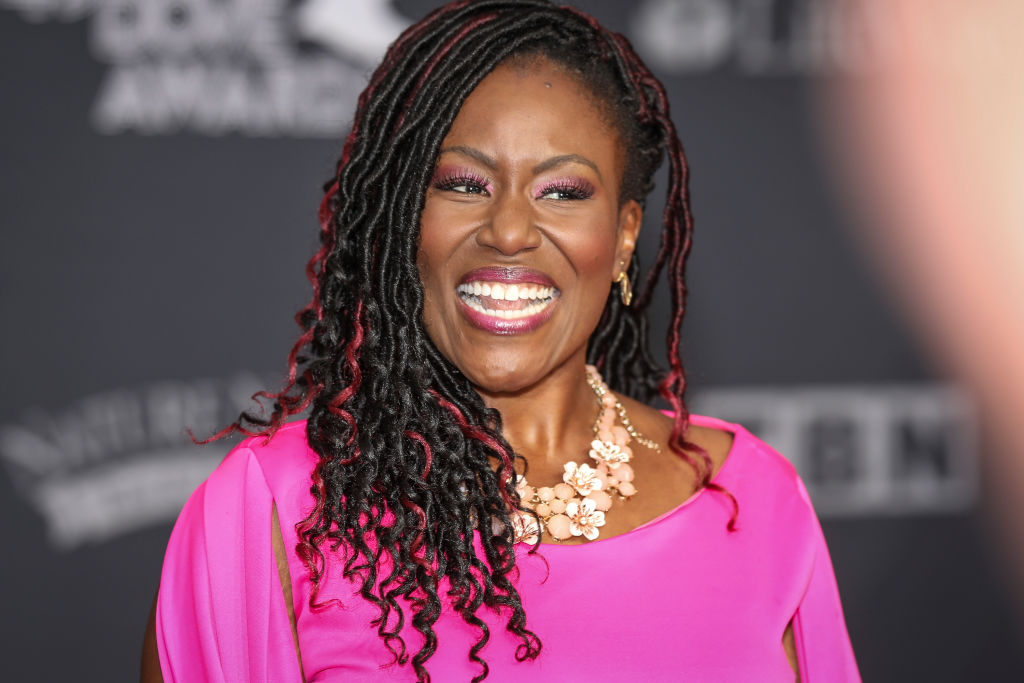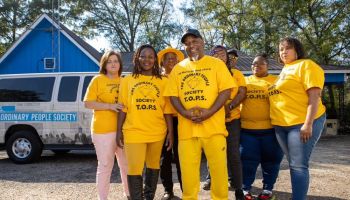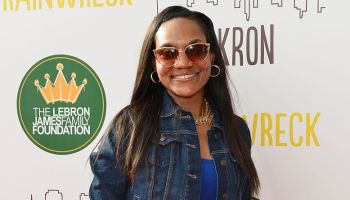MSNBC’s Tamron Hall Uses Sister’s Murder to Speak Out Against Domestic Violence
The details surrounding the death of her sister are haunting.
Renate, the sister of MSNBC “News Nation” host Tamron Hall, was found face down in the pool of her own home in 2004. There were signs of a struggle. Her sister’s hair had been pulled from the back of her head, and the nails on each of her sister’s finger were broken.
Hall knew her sister described her relationship with the man she loved as a “love-hate” situation and one where they would “break up to make up.” But the night she died, Hall’s sister had, had enough:
“My mother spoke with my sister that night, and I know she told my mother she wanted out of the relationship and it was time to move. She also spoke with my younger brother that night, and the next morning, my sister was dead,” Hall told Aol. Black Voices in an interview.
And although it’s too late for her sister, Hall is out sharing her personal story in an effort to help younger women. Hall also works with Day One, a New York City organization dedicated to the issue of teen domestic violence. As part of National Domestic Violence Awareness Month, Hall recently hosted Day One’s fundraiser and did a story on her new show, “News Nation with Tamron Hall,” about the issue of domestic violence
“She has been a wonderful advocate. When people in prominent positions come forward to discuss their individual situation, it can make a big difference on the population,” Stephanie Nilva, executive director for Day One, told Aol. Black Voices in an interview.
In many ways, Renata’s story is similar to what happens to many women.
“The most dangerous time for people is when they are trying to end a relationship. When they go to get a restraining order or they try leaving a person or other ways to put a stop to the violence, the stalking or violence can increase because that person feels a loss of control,” said Nilva.
The numbers regarding domestic violence are staggering. One in four women will experience domestic violence in their lifetime with an estimated 1.3 million physically assaulted by an intimate partner every year. Much of that abuse is never reported to police. One-third of female homicide victims are killed by an intimate partner.
For black women, the numbers are even worse. The top cause of death for black women ages 15 to 34 is homicide at the hands of an intimate partner. From 1993 to 1998, black females experienced intimate partner violence at a rate 35% higher than that of white females, and about 22 times the rate of women of other races. Only 17 percent of black women reported the abuse to police.
Hall said part of talking about her sister’s murder has taught her that she was not alone.
“For me, you instantly know that your family is not alone. I know my sister is and was not alone in her struggle to leave the relationship,” said Hall. “A lot of people have this image of a girl with bad self-esteem or her parents were not strong or her family was not close and that’s just a myth. My sister was very close to our family. My dad was a master sergeant in the army and my mom was an educator. We were a very close family and very open. My sister’s self-esteem, as far as I know, she never had weak self-esteem. She was always very confident.”
Hall said she meets many women in the same situation:
“Many of the girls I’ve met at Day One are the same way. They are in college, they have great personalities and are charming, bold and dependable young girls who, like my sister, end up in these relationships that they can’t for whatever reason walk away from, even though in their hearts and minds they know it’s wrong and they need to get out of the relationship. This experience just really just opened my eyes to the fact that my sister was not on some island alone and that what happened to her should be rare but it is not.”
Although Hall says her sister’s male partner was named as a person of interest in the case, there was never enough evidence to charge him. Her family felt the effects of her sister’s murder. Four years after the death, Hall says her normally healthy father, who had exhibited signs of depression since the incident, passed away at the age of 78 after a brief illness.
“My father died without ever seeing the person who police named as the primary and only suspect charged. My father passed away when he was 78. He was in great health. He got around. He was not frail. He got a cold that turned to pneumonia, but my mother and I have had the conversation many times over that part of my father died when my sister died,” Hall said. “When my father did pass away, my mother said she thinks that losing my sister played a great part in his ability to fight back, that some part of him was lost. He was a strong Dad and no Dad wants to see anything happen to any of his children but especially his daughters.”
To help prevent other families from feeling that pain, Hall is working with Day One to advocate for longer periods for restraining orders and tougher penalties for violating those orders.
“We are looking at legislation to protect people to increase the time of orders of protection and put some teeth behind it so these individuals know if they cross the line, they are going to jail,” Hall said. “That’s what I like about Day One. It’s not just a support group; they are actively involved in influencing legislation to show people who choose to abuse that we mean business, that it is not a crime we take lightly.”
Education is also a big part of the process. Hall said she admires Day One for reaching out to young men and teaching them that hitting or abusing women is never right. Young women also need to learn the early signs of abuse, such as a boyfriend who keeps too close tabs or beats up other boys. Too often, Hall said, young girls mistake those warning signs for signs of affection:
“It’s so easy to mistake that as crazy in love…he’s crazy about me. They don’t realize that’s not appropriate behavior,” said Hall.
Nilva said they are pushing for all 50 states to adopt relationship training in to the curriculum, so young people learn how to prevent it starting in elementary school.
“We focus on systemic change, because it gives an opportunity to make changes for broad numbers of people,” said Nilva. “What we hear from survivors we help is that they wish they had someone in high school who had talked to them about this or that they didn’t come forward because they thought it was just their relationship. When you mandate programs that teach about domestic abuse, you can cut down on that.”
Hall said the response to coming out with her sister’s story has been tremendous and that everyone can be active in preventing and helping those who are victims of domestic violence:
“The key is to move the ball forward and do something about the problem. If there’s somebody in your family, don’t stop talking. Listen and encourage them. My mother listened to my sister that night and she encouraged her to leave, but it was too late for us,” said Hall. “But if people are willing to talk, you be willing to listen and help them out of the situation. If they get mad at you because you are being nosy and pushing them, so be it.”
















